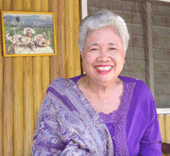Phillipines: Rethinking and redefining independence
Published on Wed, 2011-06-15 11:35
Source “On June 12, 1898, we declared ourselves independent from the crushing heel of Spanish colonialism” but “became a colony of the United States after a bloody war that killed thousands of Filipinos,” wrote Leonor Magtolis Briones, lead convenor of Social Watch Philippines, in this column for Bussiness Mirror, a major paper in her country. Magtolis Briones has served in Philippines as Treasurer, Secretary to the Commission on Audit, Vice-President of the University of the Philippines and as chair of the Board of Siliman University. She was awarded this year with the BAYI Citation for Government Service, conferred biennially by the Institute of Politics and Governance and the Barangay Bayan Governance Consortium. This is the text of the article: Dependence, independence and interdependence We declared ourselves independent, but became a colony of the United States after a bloody war that killed thousands of Filipinos. It was a war characterized by the burning of villages, a tactic replicated 60 years later in Vietnam. It was a war characterized by cholera, dysentery and typhoid epidemics —health curses we have never fully recovered from. Our years as a colony of the United States were supposed to be years of preparation for eventual independence. This was the period when the chains of economic dependence on the United States were firmly locked into place through the Bell Trade Act, approved by U.S. Congress in 1946, which allowed unlimited entry of their goods into our country, as well as exploitation of our natural resources. As a United States colony, we became a magnet for the hegemonic designs of Japan. We were dragged into World War II. Thousands of Filipinos died in a war not of their making. A few living Filipinos can describe that horrific period —the rape of our women, indescribable torture for our guerrillas, our infants tossed into the air and bayoneted, and bellies of pregnant women ripped open by the Japanese sword. On July 4, 1946, we declared once more our independence. This time it was independence from the United States. This independence turned out to be empty. Our economy and infrastructure were totally destroyed by the war. We had become addicts and junkies of imported goods; we did not have the capacity to produce consumer goods ourselves. Like our economy, our national security was chained to that of the United States through the Military Bases Agreement signed in 1947. Independence in the age of interdependence Our celebration took place in the age of interdependence and globalization. What does our independence mean in the Year of Our Lord 2011? How do we define it in terms of globalization? How do we define independence at a time of rising levels of poverty and unemployment, threats of climate change, unbalanced economic growth, massive social problems, corruption in the government, and threats to our national security? The challenge to all of us, especially our nationalists, educational institutions, leading citizens and opinion-makers is to rethink and redefine the meaning of independence at this time and age. Weeping with joy on Independence Day My mother would weep openly while watching the soldiers march by. The sight of them brought back memories of the years of Japanese brutality and the gallantry of our guerrillas. For her and the ordinary Filipinos of the time, the soldiers and guerrillas were the heroes who gave us our independence. |


